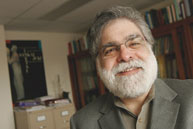Roots of resilience
Referring to his own people, an Australian Aboriginal once told Laurence Kirmayer that to be healthy, "we need to be needed by the land." To experience such a profound, even healing, connection to "the land" is a notion that resonates deeply in many indigenous cultures, playing a large role in many indigenous narratives of mental health; it's a source of indigenous peoples' resilience.

Psychiatrist Laurence Kirmayer, editor-in-chief of Transcultural Psychiatry, researches suicide prevention among Inuit youth, mental health services for immigrants and refugees, and the anthropology of psychiatry.
Owen Egan
Kirmayer, director of the Division of Social and Transcultural Psychiatry, is heading a new cross-cultural research program, "Roots of Resilience: Transforming Identity and Community in Indigenous Mental Health," that was awarded $3.2 million by the International Collaborative Indigenous Health Research Partnership, the Canadian Institutes of Health Research and the Health Research Council of New Zealand. Initially, in addition to Canada and New Zealand, the project was to include an Australian component, but official funding from that country fell through. Kirmayer, who is overseeing the entire international program, is nevertheless working too find ways to include and involve Australian researchers and Aboriginals in the program.
In each country, Aboriginals can be counted among the investigators. One of the program's objectives is to work with indigenous peoples, not on indigenous peoples. To avoid replicating the often unavoidable colonialism of traditional research models, the communities themselves are not to be treated simply as research subjects but as active partners and participants.
The Canadian team - which also includes McGill professors Jacob Burack, Faculty of Education, and Phyllis Zelkowitz, Institute of Community & Family Psychiatry - will be working with First Nations, Inuit, and Metis communities from across the country. The program will seek to identify the distinct nature of resilience in indigenous communities by collecting indigenous stories of resilience and healing, observing the characteristics of resilient indigenous communities, and examining indigenous frameworks for diagnosis and treatment.
The idea of resilience - that after being subjected to stress factors, individuals can "snap back" to their former state - is being not so much challenged as expanded by this program. For Kirmayer, the accepted view of resilience is too mechanical and does not take into account the profoundly transformative effects of the stress factors - such as loss of land in the case of indigenous communities - that impact mental health. Life is a process: neither people nor communities can ever simply "snap back". Building on existing research on resilience, Kirmayer wants this new study to broaden our understanding of resilience and its manifestations in various cultures. To be resilient might imply a transformation into a new state of health that takes into account the past traumatic experiences.
Traditionally in psychiatry the notion of resilience has been used in the case of individuals. Kirmayer wants to extend the concept to families and communities, and to their relationships with the larger society.
Mental health is integral to how twenty-first-century Westerners narrate their life stories, their identities. For Kirmayer it is imperative, when working with indigenous peoples, not to import these preconceptions but to respect and learn from each culture's own life narratives.
Kirmayer, who has been working with indigenous communities since the 1980s, stresses that "Roots of Resilience" is not an aid intervention. The study concentrates on mental health rather than mental illness, and he's loath to perpetuate the paradigm of victimization that often shackles indigenous communities. For him, this is an opportunity for communities and societies, indigenous and otherwise, to learn from each other by sharing knowledge, research and experience.

